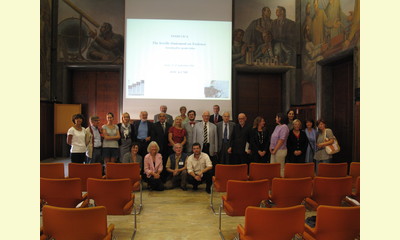|
|
The Seville Statement on Violence: twenty-five years later
un article par Camilla Pagani
An international conference on violence, with the participation of a multidisciplinary group of scholars from five continents, was held in Rome between 22nd and 25th September 2011. It was organized by Dr. Camilla Pagani (Institute of Cognitive Sciences and Technologies, National Research Council – ISTC, CNR) and by Prof. Martin Ramirez (Universidad Complutense Madrid). The sessions took place at the CNR headquarters and at the ISTC.

Participants in the conference
click on photo to enlarge
The conference, entitled “The Seville Statement on Violence: twenty-five years later”, was the thirty-third of the international workshops that CICA (Coloquios Internacionales sobre Cerebro y Agresión), an international group of experts coming from various disciplines, holds regularly twice a year. The international, interdisciplinary, comprehensive approach characteristic of these meetings provides a useful biosocial focus by bringing together a number of disciplines to more effectively analyse the complex relationships among brain, aggression, and society.
This year the conference was held in concomitance with the 25th anniversary of the Seville Statement on Violence, a multidisciplinary document elaborated by scientists (including Prof. Ramirez himself) from all the continents in 1986 at the University of Seville and adopted by UNESCO. This document provides scientific information contradicting the myth that the human capacity for aggression makes war and violence inevitable and identifies in socio-cultural factors the main causes of violence. Most importantly, it also highlights the role of education in preventing, diminishing and eliminating violence.
The Seville Statement was also endorsed by a number of well-known significant scientific organizations, among which the American Psychological Association, the American Anthropological Association, the American Sociological Association, and the International Society for Research on Aggression - Commission on Violence. UNESCO created an international network for its dissemination, whose Italian representative has been Prof. Francesco Robustelli (ISTC).
During the round table, at the end of the conference, participants discussed the opportunity of re-examining and, in case, of improving the Seville Statement. In the end they agreed on the opportunity of writing a new scientific document, for which a preliminary working group was established. Indeed, though the fundamental thesis enunciated in the Seville Statement, whereby human violence is not unavoidable, as it is not biologically determined but is basically related to socio-cultural factors, is still valid, nevertheless it is useful to further develop this thesis also in the light of the new research findings that have been obtained in these last twenty-five years. Though the new document will be strictly scientific, its style and form will be such as to make it perfectly comprehensible for the general public, so that its impact on social reality will be even stronger.
|








|
DISCUSSION
Question(s) liée(s) à cet article:
Are nonkilling societies possible?, If yes, what should we be doing? If not, what will happen to us?
* * * * *
Commentaire le plus récent:
Promoting Communication Literacy through Principles of Compassion for a Nonviolent Planet
by Vedabhyas Kundu
At a time when there are conflicts at different level around the world, promoting COMMUNICATION LITERACY through principles of compassion is a necessity so as to bring people together and collectively work for global peace.
Compassion and feelings for others are essential ingredients for human unity. Swami Vivekananda had said, “Do you feel for others? If you do, you are growing in oneness. If you do not feel for others, you may be the most intellectual giant ever born, but you will be nothing; you are but dry intellect, and you will remain so.”
Indeed in today’s contemporary society when there are so much of differences and intolerance, if we can’t promote feeling and compassion for others, we cannot promote oneness amongst one another. There seems to be crisis of values and little respect for each other’s ideas and perspective. For a large number of people, the self seems to be the supreme and are agnostic about the feelings of others. Anger and hatred towards each other seems to be found in abundance. All these will lead to greater conflicts and ill feelings amongst fellow beings. Swami Vivekananda pertinently underlines that howsoever one may acquire intellectual power, without compassion for others, one is nothing. . ... continuation.

|
|









